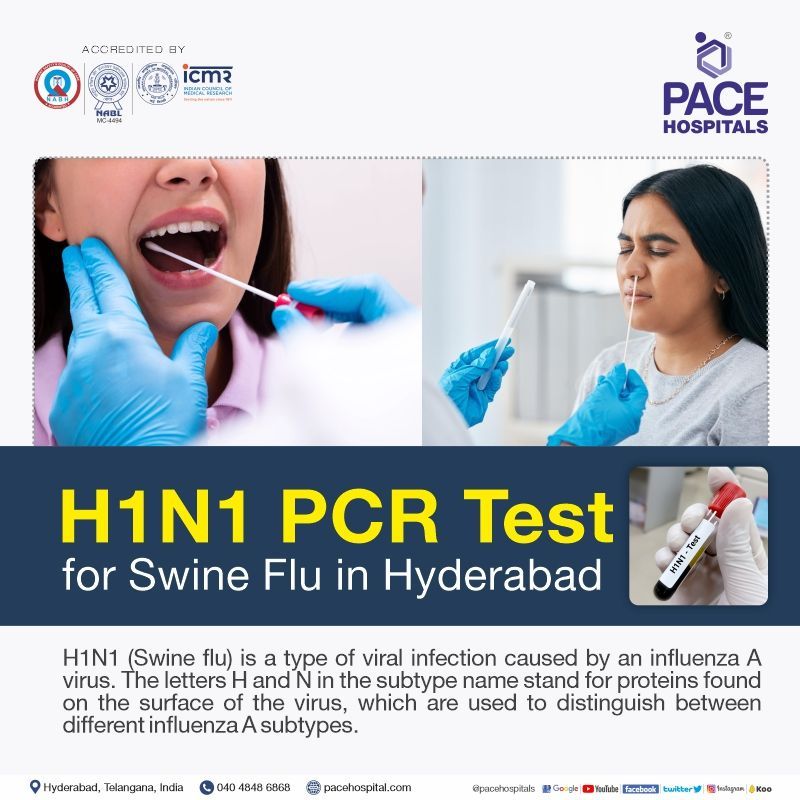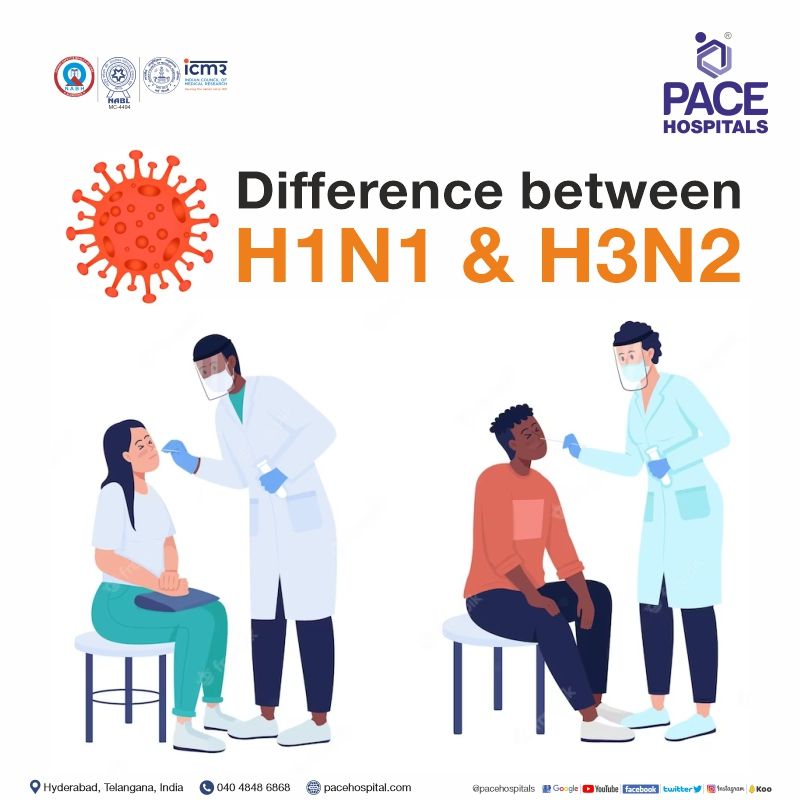H1N1 PCR test for Swine Flu in Hyderabad - Cost and Home Collection
At Pace Hospitals, modern and advanced diagnostic lab is accredited by National Accreditation Board for testing and Calibration Laboratories (NABL). Our state-of-the-art RT-PCR testing lab is approved by The Indian Council of Medical Research (ICMR), New Delhi.
How to book H1N1 test online?
People living in Hyderabad can book H1N1 PCR test online at Pace Hospitals by following these steps:-
- For online booking, fill up the form - Request an appointment for H1N1 test.
- After successful submission, kindly go to Swine Flu Screening Test Packages, select one out of 3 choices and proceed to pay.
- Visit PACE Hospitals, Hitech City to give swab sample for PCR test. In case of home collection, our team will co-ordinate and visit your place to collect swab samples.
- H1N1 PCR Test will take upto 24 hrs, you will receive message from hospital once your H1N1 test report is ready. By following the link, you can download the report in PDF format.
- To know more, kindly call us at 04048486868
What is H1N1 Test?
The H1N1 test is used to identify the presence of the influenza H1N1 virus when a patient suffers from flu. If the patient has any of the flu symptoms, not limited to high fever (104°F) for more than three days, cough, headache, lack of hydration, chest pain, low blood pressure, running nose, body pain, sore throat, vomiting, and its sensation, they need to visit the pulmonologist.
If the pulmonologist suspects the presence of flu symptoms, especially H1N1 (swine flu), the doctor will perform a thorough physical examination and request an H1N1 swab test to detect the presence of Influenza A for diagnosis of h1n1 flu. It includes the collection of the throat and nasal/ nasopharyngeal swab samples and is sent for analysis (laboratory) to detect the H1N1 flu virus.
Swine Flu Screening Test Packages
Multiplex Flu PCR Test can detect if person is infected with Influenza A, Influenza B, H1N1, H3N2 and coronavirus or not, whereas H1N1 PCR test can detect if person is infected with swine flu (Influenza A virus) or not, and H3N2 PCR test will help in detecting Influenza A H3N2 variant viruses.
Multiplex Flu PCR Test
Rs 5500
Test includes:
Influenza A, Influenza B, H1N1 Gene Value, H3N2 Gene Value, COVID RT-PCR Routine
Report time: 12 Hrs
*sample collection at hospital
H1N1 PCR Test
Rs 2500
Test includes:
H1N1 Gene VALUE
Report time: 12 Hrs
*sample collection at hospital
H3N2 PCR Test
Rs 2500
Test includes:
H3N2 Gene VALUE
Report time: 12 Hrs
*sample collection at hospital
Difference between H1N1 and H3N2
| Elements | H1N1 | H3N2 |
|---|---|---|
| Severity | Less severe | More severe and long term |
| Surface proteins | Hemagglutinin1 and Neuraminidase1 | Hemagglutinin3 and Neuraminidase2 |
| RNA Genome size | 13.5 kb | 13,628 nucleotides in length |
| First reported in Humans | In the year 2009 | In the year 2011 |
| Synonym | H1N1 pdm09 | H3N2v |
H1N1 test process
The H1N1 test process includes the detection of H1N1 virus. The diagnosis of h1n1 flu (influenza A) can be difficult because the virus's symptoms (H1N1) are similar to those of other respiratory viruses, such as rhinoviruses, adenoviruses, parainfluenza, and respiratory syncytial virus. The incubation period for Influenza is 2 to 3 days, and a viral sample from a patient's nose and throat swabs will be collected.
- Within 2 to 3 days from the day of infection,
- Before the administration or use of antiviral drugs and
- After the onset of H1N1 symptoms.
Swine flu H1N1 swab test
The H1N1 swab test procedure includes the insertion of a dry swab into the nostril and back of the nasopharynx (upper part of the throat behind the nose), where the technician leaves the swab for a few seconds. Slowly remove the swab while slightly rotating. Another new swab will be used for the adjacent nostril, and the same process will be repeated. The tip of the swab will be placed into a Viral Transport Medium (VTM) filled vial by breaking the applicator stick.
A nasopharyngeal swab, nasal wash, or nasal aspirate are preferred respiratory samples to use for influenza H1N1 test. If the above samples are unavailable, a nasal swab and/or oropharyngeal swab will be acceptable. In intubated patients, an endotracheal aspirate will be collected.
These samples will be preserved in a sterile viral transport medium, kept under cold temperature (on ice, in cold packs, or the refrigerator, preferably at 4°C), and sent for further analysis to the specialised laboratories within 48 hours of transportation.
The influenza virus (H1N1) first appeared in April 2009 in Mexico and quickly spread over the world. On the 11th of June, 2009, the World Health Organization (WHO) proclaimed a global pandemic of phase 6 level, which lasted until the 10th of August, 2010 and resulted in multiple deaths worldwide. Classical swine H1N1 was originally identified in pigs in the United States in 1930, following the 1918 pandemic of the same name.
Types of H1N1 tests
There are many possible detection tests available, each with its own level of specificity. The detection techniques for influenza A(H1N1) can be classified into the following categories:
Clinical Diagnosis (CD)
- Virus culture
- Immunofluorescence assays
Surveillance Method (SM)
- Rapid influenza detection tests
- PCR-based detection methods
- Non PCR based RNA specific detection methods
- Biosensors
H1N1 PCR test
The PCR test for H1N1 is a standard laboratory method for detecting the H1N1 virus by multiplying a segment of DNA to several times.
Polymerase is an enzyme responsible for the formation of DNA polymers. It only detects the presence of DNA. The chain reaction is a chemical reaction that progresses in an exponential form. The polymerised chain reaction is a laboratory technique used to identify the type and properties of the virus by amplifying its DNA.
In general, there will be a conversion of DNA to messenger RNA (mRNA) through a process known as transcription. In the reverse transcriptase polymerase chain reaction (RT-PCR), as the polymerase detects only DNA molecules, the RNA of the virus will be converted into DNA, a process called reverse transcription (RT). With the help of the PCR technique, the single viral DNA will be amplified and will produce several copies (polymers) of viral DNA, leading to the accurate detection of viral presence.
Steps of H1N1 PCR Test
A sample will be collected from the areas such as the nose and throat of the patient, and the obtained sample will be treated with certain chemicals to remove proteins, fats and extract only the viral RNA.
The viral RNA will be converted to DNA by a reverse transcription mechanism with the help of certain enzymes.
Taq probe, DNA polymerase, reverse transcriptase enzyme, primers, and nucleotides are the essential components of a polymerase chain reaction (PCR). DNA synthesis involves assembling these components in a tube with the necessary cofactors for the enzyme and then subjecting the mixture to repeated heating and cooling cycles.
The mixture along with extracted RNA will be placed in an RT-PCR machine; the machine heats and cools the mixture to trigger specific chemical reactions and makes several copies of viral DNA in an exponential form.
Each RT-PCR cycle follows the basic steps after the formation of DNA from viral RNA (reverse transcription) such as
- Denaturation
- Annealing
- Extension
The obtained DNA copies go through the same procedure, and each cycle produces an exponential number of DNA copies. The standard PCR process involves 35 cycles and produces 35 billion new DNA copies, as well as an equivalent quantity of fluorescence. This fluorescence will be recorded as digital data using Real-time PCR.
Frequently asked questions:
How do I know if I have H1N1?
If any patient suffers from flu symptoms, including but not limited to high temperature, body pains, sore throat, cough, headache, fatigue, chills, frequent bowel moments (diarrhoea), and vomiting, the patient needs to visit a nearby pulmonologist for further analysis of H1N1. After observing the symptoms and assessing the risk factors, the pulmonologist would suggest an H1N1 test (rapid or standard). If the test results indicate "positive," it indicates the person is infected with H1N1.
Is H1N1 test painful?
H1N1 PCR test is not a painful but may result in discomfort, and it totally depends upon how the body responds to throat and nasal /nasopharyngeal swab sample collection for swine flu. Discomfort level may vary from person to person due to pain tolerance level. Throat and Nasal swab collection may result in tears in eyes, nose pain, coughing, gagging, sneezing that may remain for 20 mins to 3 hours in a person.
How to read H1N1 test report?
The H1N1 test is used to detect the presence of the influenza A virus that causes swine flu. It consists of either a positive or negative result. H1N1 test positive means, it indicates the person is infected with the swine flu virus (H1N1). If it reports as negative, it shows the patient had normal (seasonal) flu in case of having flu symptoms.
Who should go for the H1N1 pcr test?
The H1N1 flu test is not for everyone; only the persons meeting the following prerequisites are eligible for an H1N1 test.
- Age less than five years and more than 65 years
- Adults and children with weak immunity
- Infected patients in the hospital with influenza
- Family members who died of acute illness where influenza would be a probable cause
- Pregnant women
- Front-line workers in nursing homes and other long-term care centres
- Adults and kids with long-term respiratory, cardiovascular, liver, blood, neurological, neuromuscular, or metabolic issues
What is the price of H1N1 test in India?
Average price of H1N1 test in India is approximately Rs 2,800 (INR two thousand eight hundred only). However, cost of H1N1 test in India may vary from Rs 2,500 to Rs 3,500 (INR two thousand five hundred to three thousand five hundred) in different private hospitals, different diagnostic centers from different cities.
How much does H1N1 test cost in Hyderabad?
Average price of H1N1 test in Hyderabad is approximately Rs 2500 (INR two thousand five hundred). However, H1N1 test costprice in Hyderabad may vary from Rs 2,200 to Rs 2,800 (INR two thousand two hundred to two thousand eight hundred) in different diagnostic centers and private hospitals.








